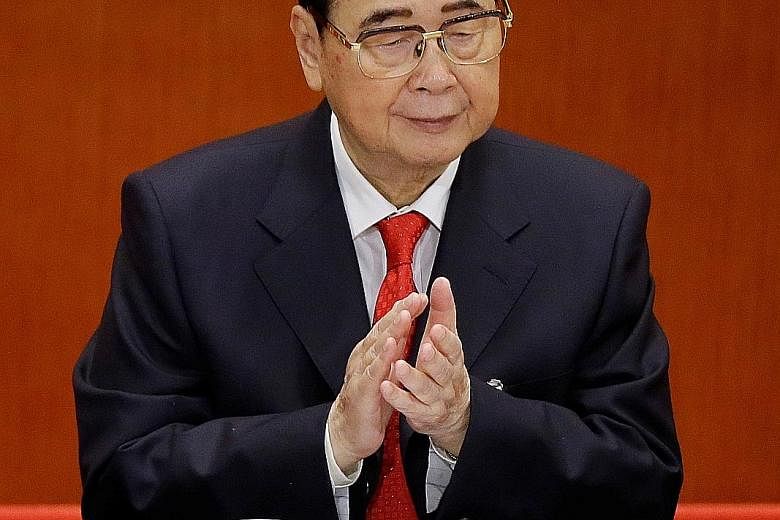Former Chinese premier Li Peng, who declared martial law on national television days before the 1989 Tiananmen crackdown, died just before midnight on Monday of unspecified illness, state media announced yesterday. He was 90.
Mr Li was one of the longest-serving members of the Communist Party's Politburo Standing Committee, the pinnacle of power in China, serving three five-year terms until 2002.
He was ranked second in the Standing Committee behind the party chief but was passed over for promotion to the top job, apparently to avoid further stoking public anger at the party and the military after the pro-democracy protest was crushed by the army.
In its obituary, the Xinhua news agency called Mr Li a "tried-and-tested, staunch communist warrior and an outstanding socialist revolutionary".
Mr Li served as premier from 1987 to 1998, and as chairman of the National People's Congress - China's Parliament - from 1998 to 2003.
A Russian-educated engineer by training, Mr Li was the son of an early communist revolutionary who was executed by the Kuomintang, or Nationalist Party, which ruled most of China until 1949. He was later cared for by then Premier Zhou Enlai and his wife.
His rise to premiership was attributed in part to the ousting of General Secretary Hu Yaobang, who was blamed by the party for widespread student protests in 1987. Then Premier Zhao Ziyang took over as general secretary, and Mr Li moved up to become premier.
Unlike Mr Hu and Mr Zhao, the conservative Mr Li was opposed to political and economic reforms and favoured greater state control.
With the blessings of patriarch Deng Xiaoping, Mr Li ordered troops to seize Tiananmen Square on the night of June 3, 1989, leading to bloodshed as the military gunned down unarmed protesters.
He remained in the top echelons of power after that, as party elders sought to maintain stability.
Mr Li notably visited Singapore in August 1990, near the tail-end of the Cold War and following the normalisation of relations between China and Indonesia.
Then Prime Minister Lee Kuan Yew had praised this as a positive development for the region, and said Singapore hoped to also establish diplomatic relations with China in the coming months. The two countries officially formalised diplomatic ties that October.
In 1993, Mr Li suffered a heart attack but remained as premier until 1998, when the economically reform-minded Zhu Rongji took over.
In 2010, a diary widely believed to have been written by Mr Li was leaked onto the Internet. In it, he apparently tried to absolve himself of the responsibility of the Tiananmen crackdown, pinning the blame both on Deng and the spectre of another Cultural Revolution-style period of tumult.
Hong Kong book publisher Bao Pu attempted to publish the diary, but was forced by the Chinese authorities to pull the project over copyright ownership.
By stopping its publication, the Chinese authorities appeared to give credence to the authenticity of the diary. The Chinese government has made no public comments to either confirm or deny its authenticity.
There was, however, an official memoir published in 2014, in which Mr Li made no mention of the Tiananmen incident, writing about events up till only 1983.
He considered the controversial hydroelectric Three Gorges Dam as his main political legacy. Once the world's largest power station, the project flooded archaeological sites and displaced 1.3 million people.
Mr Li also came under attack for creating a large power monopoly run by his family, which was later broken up by the government after his retirement.
Observers such as Hong Kong-based political analyst Willy Lam said Mr Li is likely to be remembered as a Tiananmen hardliner who was instrumental in persuading Deng to crack down on the student protesters.
"While he is still respected by the conservative wing of the party, he did not do much for economic reform - even though the premier's basic job is handling the economy - compared with his successor, who was much praised for getting China into the World Trade Organisation," said Dr Lam.
"I am afraid that for most people, he will be remembered as an arch-conservative who was instrumental in persuading Deng Xiaoping to use draconian methods against the students by exaggerating the damage they were doing to the party and the country."
Mr Li is survived by his wife Zhu Lin and three children. His elder son, Mr Li Xiaopeng, 60, is China's Transport Minister after serving as governor of the northern coal-rich province of Shanxi from 2012 to 2016.
His only daughter, Ms Li Xiaolin, 58, is the flamboyant vice-president of state-owned Datang Corporation, one of the country's biggest power generation companies. His younger son, Mr Li Xiaoyong, 55, is a businessman.

